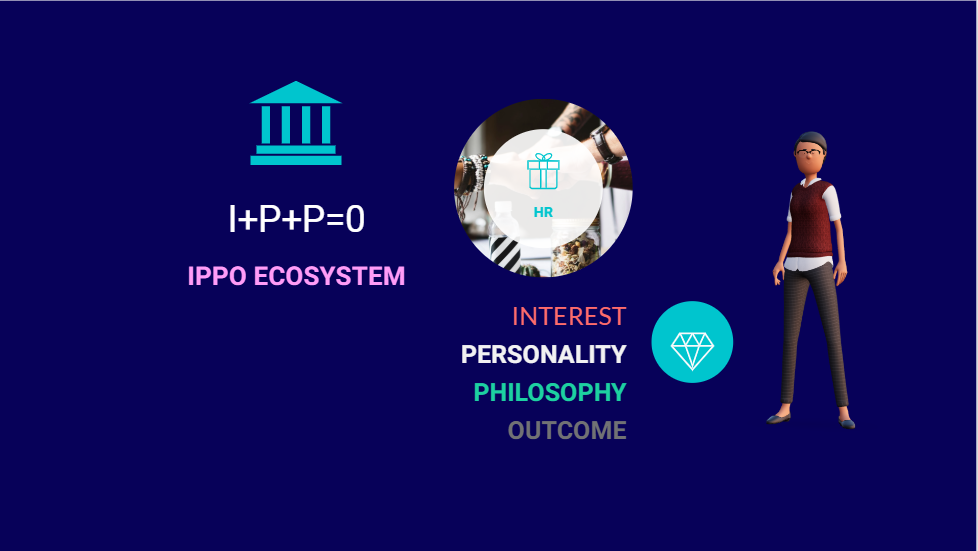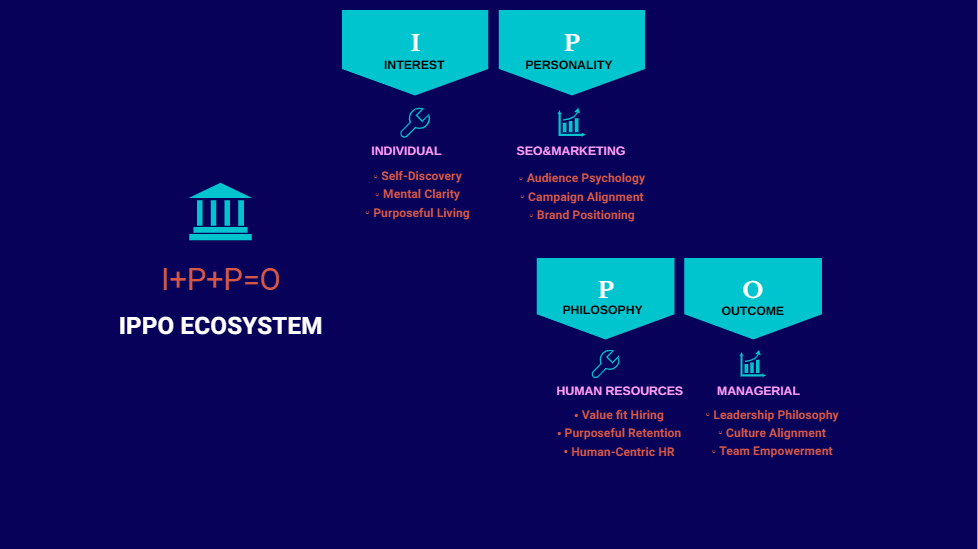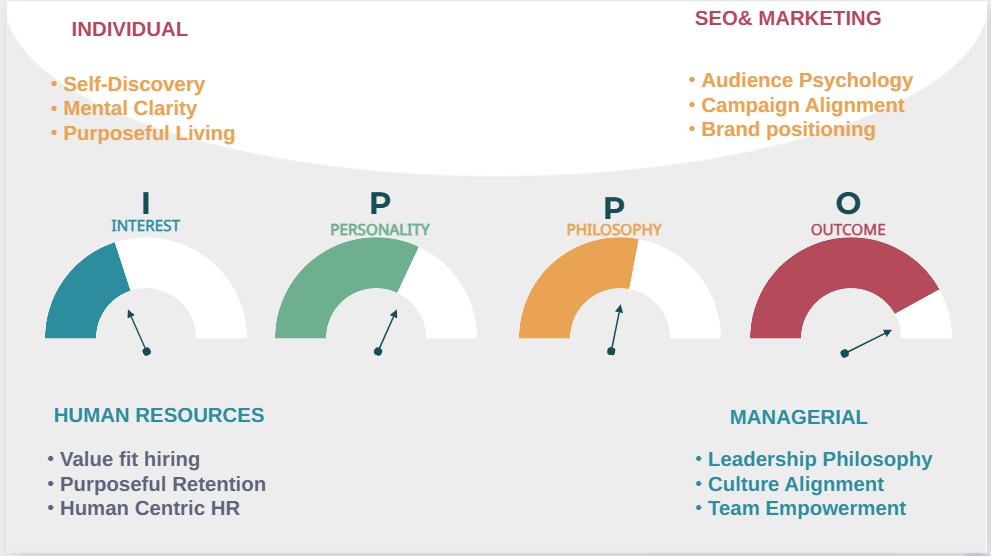IPPO Model Alignment





In a world where human decisions, motivations, and work patterns are increasingly driven by external performance metrics, the need to re-center individuals around their inner truths has never been more urgent. While most frameworks in psychology and organizational behavior focus on measurable behaviors, productivity, or personality traits, they often overlook a foundational layer—philosophy. The IPPO Model (Interest, Personality, Philosophy, Outcome) is a response to this gap, offering a new approach to understanding human fulfillment and systemic alignment by integrating both cognitive and existential dimensions.
The model originated not from a corporate whiteboard but from a personal journey—an inner quest to answer the timeless questions: “Who am I?”, “What matters to me?”, and “Why do I feel unfulfilled despite achieving external success?” This philosophical introspection led to the realization that any sustainable outcome—whether personal satisfaction, professional growth, or organizational culture—must be rooted in the alignment of what we love (Interest), how we behave (Personality), what we believe (Philosophy), and what we achieve (Outcome).
The IPPO Model transforms this personal realization into a structured framework. It is designed to work across disciplines—empowering individuals, leaders, educators, and marketers to design more authentic lives, products, and systems. From enabling HR departments to assess value-aligned talent, to helping digital marketers refine audience targeting, to guiding students in career decisions—the IPPO framework adapts meaningfully.
The IPPO Framework: A Model of Alignment and Fulfillment

The IPPO Model consists of four core components: Interest, Personality, Philosophy, and Outcome. Together, they create a dynamic framework that links inner identity with external experience. Unlike models that emphasize fixed traits or top-down directives, IPPO starts from within—encouraging individuals and organizations to operate in harmony with their core nature.
3.1 Interest (I): The Spark of Energy
Interest represents what energizes a person—what they are naturally drawn to, what excites them, and what they are willing to do without external pressure. It often manifests in hobbies, topics of fascination, or tasks that feel intrinsically rewarding.
Key Questions:
- What do you enjoy doing even when no one asks you to?
- What activities make time feel like it flows?
Organizational Use:
Interest-based alignment in job roles increases engagement, creativity, and intrinsic motivation.
3.2 Personality (P): The Mode of Expression
Personality refers to how a person behaves, communicates, and processes experiences. It includes psychological traits like introversion, openness, conscientiousness, etc., and influences interaction style, problem-solving, and emotional regulation.
Key Questions:
- Are you analytical or intuitive?
- Do you prefer structure or spontaneity?
Organizational Use:
Recognizing personality types improves team dynamics, role placement, and leadership development.
3.3 Philosophy (P): The Inner Compass
Philosophy is the individual’s belief system—what they believe life is about, what values they prioritize, and how they interpret meaning, justice, purpose, or truth. It is often unconscious yet deeply influential.
Key Questions:
- What do you believe makes life meaningful?
- What values are non-negotiable to you?
Organizational Use:
Philosophical alignment between individuals and institutions improves integrity, cohesion, and long-term retention.
3.4 Outcome (O): The Reflection of Alignment
Outcome is the visible result of how well a person’s life or work aligns with their interest, personality, and philosophy. It includes success, fulfillment, stability, and clarity. Misalignment leads to burnout, confusion, and dissatisfaction.
Key Questions:
- Are your current achievements aligned with your deeper truths?
- Does your life reflect who you are?
Organizational Use:
Outcome mapping is used to evaluate alignment between culture and workforce, and to design interventions that reduce internal conflict or attrition.
Applications of the IPPO Model
One of the strengths of the IPPO Model lies in its versatility. While rooted in philosophical introspection, it is equally effective in practical domains such as Human Resources, Education, Digital Marketing (especially SEO), and Organizational Leadership. The model can be adapted to suit both individual self-discovery and systemic transformation, making it a tool for sustainable personal and institutional growth.
4.1 In Human Resource Management
Modern workplaces suffer from high employee turnover, disengagement, and misfit hires. Traditional recruitment focuses heavily on skills and experience, often neglecting the deeper layers of alignment.
IPPO Contribution:
- Recruitment & Role Fit: By integrating IPPO assessments during recruitment, organizations can match candidates with roles that suit their interests, personalities, and philosophies.
- Retention & Growth: Employees whose values align with the organization’s mission are more likely to remain loyal and grow internally.
- Leadership Development: Identifying philosophical congruence in leadership roles ensures ethical consistency and team trust.
Tools Used:
- IPPO Alignment Matrix
- Personality-Value Fit Quiz
- Leadership Belief Assessment
4.2 In Education Systems
Many students select academic fields due to social expectations or immediate benefits, which can result in future discontent. Educational systems often prioritize quantifiable knowledge over intrinsic understanding.
IPPO Contribution:
- Career Guidance: Helps students align their studies with their interests and belief systems.
- Self-Discovery Curriculum: Encourages philosophical thinking from a young age, cultivating integrity, critical thinking, and purpose.
- Teacher Training: Educators can use IPPO to understand student motivation and foster environments aligned with individual growth.
4.3 In SEO and Digital Marketing
Traditional SEO focuses on keywords and algorithms. However, modern consumers are driven by trust, resonance, and emotional alignment. The IPPO model introduces a value-based psychological targeting strategy.

IPPO Contribution:
- Audience Segmentation: Brands can segment audiences by IPPO types—e.g., curiosity-driven, ethically driven, security-driven.
- Content Alignment: Messaging that aligns with user philosophy has higher conversion potential.
- Authentic Branding: When brand identity reflects shared values, it builds lasting relationships.
4.4 In Organizational Leadership
Leadership failures often stem from a disconnect between values and vision. Charisma without philosophical grounding can lead to short-term wins but long-term damage.
IPPO Contribution:
- Three-Tier Leadership Model: The IPPO model includes a 3-tier framework:
- Ground-level managers motivate daily behavior.
- Middle managers translate beliefs into cultural norms.
- Top leaders project vision based on personal philosophy.
- Ground-level managers motivate daily behavior.
- Cultural Alignment: Leaders whose philosophies align with institutional missions create transparent, value-driven cultures.
- Crisis Leadership: IPPO-aligned leaders perform better under uncertainty because their actions are grounded in deeply held beliefs.
Alignment of leadership philosophies with institutional missions fosters transparent, value-driven organizational cultures. Leaders grounded in deeply held beliefs and aligned with established principles demonstrate enhanced performance during periods of uncertainty and crisis.
4.5 In Personal Coaching & Counseling
IPPO can also be used by life coaches, therapists, and counselors to help individuals clarify decisions, navigate transitions, or recover from burnout.
The IPPO framework extends its applicability to the realm of personal coaching, therapy, and counseling, providing a structured approach for practitioners to guide individuals through various life challenges. Life coaches can leverage IPPO to assist clients in making informed decisions about their future paths, whether personal or professional. Therapists and counselors can integrate it into their practice to help individuals navigate significant life transitions, such as career changes, relationship shifts, or personal losses. Furthermore, IPPO can be a valuable tool in addressing burnout, enabling clients to identify the underlying imbalances contributing to their exhaustion and develop strategies for recovery and sustainable well-being.
Join us at MyPhilos—where thought meets purpose, and every philosophy shapes a meaningful life.